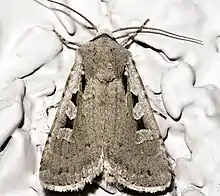Euxoa tristicula
Euxoa tristicula, the early cutworm, is a moth of the family Noctuidae. It was first described by Herbert Knowles Morrison in 1876 and is found in the United States and Canada,[1] where it ranges from southern British Columbia, south through Oregon to central California along the coast. The habitat consists of coastal rainforests, mixed hardwood forests, and mixed hardwood-conifer forests at low to middle elevations west of the Cascades.[2]
| Euxoa tristicula | |
|---|---|
 | |
| Scientific classification | |
| Domain: | Eukaryota |
| Kingdom: | Animalia |
| Phylum: | Arthropoda |
| Class: | Insecta |
| Order: | Lepidoptera |
| Superfamily: | Noctuoidea |
| Family: | Noctuidae |
| Genus: | Euxoa |
| Species: | E. tristicula |
| Binomial name | |
| Euxoa tristicula (Morrison, 1876) | |
| Synonyms | |
| |
The wingspan is 38–42 mm. The forewings are whitish to greyish with large discal spots. The hindwings are dark brown to grey with a paler fringe.[3] Adults are on wing from late spring to early September.
References
- Savela, Markku. "Euxoa tristicula (Morrison, 1875)". Lepidoptera and Some Other Life Forms. Retrieved January 8, 2018.
- "Euxoa tristicula (Morrison, 1876)". Pacific Northwest Moths. Retrieved January 8, 2018.
- Bug Guide
External links
- "933342.00 – 10723 – Euxoa tristicula – (Morrison, 1876)". Moth Photographers Group. Mississippi State University. Retrieved January 8, 2018.
This article is issued from Wikipedia. The text is licensed under Creative Commons - Attribution - Sharealike. Additional terms may apply for the media files.